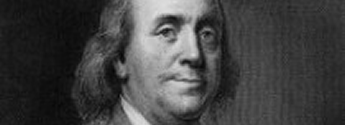Leader
Robert A. FergusonGeorge Edward Woodberry Professor of Law, Literature and Criticism
Columbia University Law School
National Humanities Center Fellow
About the Seminar
Benjamin Franklin’s Autobiography stands near the headwaters of American literature and culture. The quintessential rags-to-riches story, the first in a seemingly endless line of self-help books, a guide to the deliberate creation of a public image, the Autobiography describes the emergence of an archetypal American. Franklin was the only Founder to put his life successfully on paper.
Why did he do it, especially since the Autobiography does not always show him in a favorable light? Why does he stop when he does, relatively early in his life, before the period of his greatest accomplishments? We know he wrote the Autobiography in fits and starts over the 1770s and 1780s. What difference does that make to the coherence of the whole? He left himself open to criticism, from some in his own time and from many, like D.H. Lawrence, later on. Why would a man so conscious of public perceptions have done so? What do we think of Franklin after reading the Autobiography? What of permanent value do we learn from it? And above all, why should everyone read it now?
Online Evaluation
Online evaluation for seminar participants.Technical Help
Visit our technical specifications page for information about the seminar forum and classroom.
![]() View a brief introduction to AIC online seminars.
View a brief introduction to AIC online seminars.
Assigned Readings
- The Autobiography of Benjamin Franklin. Part One and Part Two. Alternate downloadable pdf.
- Chapter 2, Benjamin Franklin, in Studies in Classic American Literature, by D.H. Lawrence.

